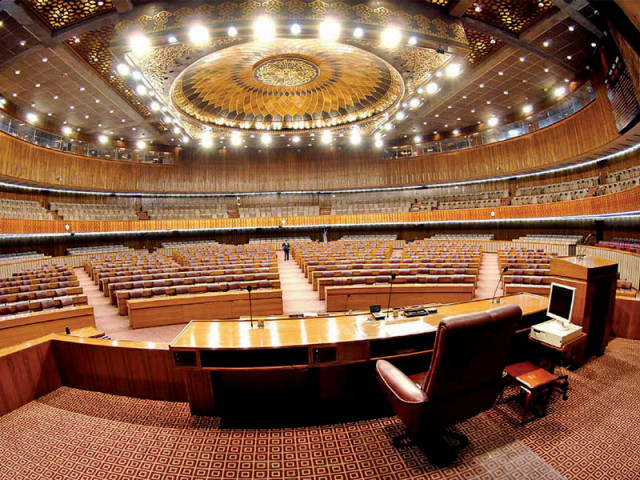Preparing for presidential polls: National Assembly set to temporarily ‘suspend’ house rules
A special session will be held today to pass a motion allowing ECP officials inside the assembly hall.

PHOTO: FILE
No one save the members and staff of the National Assembly can enter its hall at any moment during the house’s ‘business hours’.
But on Tuesday, this rule will have to be overlooked to allow the Election Commission of Pakistan to administer the election for the president of Pakistan.
To authorise ECP officials and the presiding officer – the chief justice of the Islamabad High Court – to take over the joint sitting of Parliament for the election, MNAs will meet today (Monday) to ‘suspend’ the rules of the house temporarily.

“The house will move a motion, giving consent to suspend the rules of the National Assembly in order to allow the hall to be used by the ECP for the presidential election,” said Deputy Secretary (Legislation) National Assembly Muhammad Mushtaq. According to him, the NA Speaker does not have the authority to allow the ECP to use the assembly’s hall for elections.
The same procedure will be adopted by all provincial assemblies that comprise the electoral college for the election of the president. The chief justices of the respective high courts will preside over the elections in all five assemblies across the country at the same time.
Today’s NA session was summoned by President Asif Ali Zardari. It will prorogue after adopting the motion for allowing the ECP to use parliamentary facilities for the conduct of the presidential election – which will be held the following day (July 30).

The NA speaker, in line with rule 9(b) of the Presidential Election Rules 1988, has already summoned the session of the parliament on Tuesday at 10am for the purpose of electing the president.
On the election day, the IHC chief justice will preside over the joint session of the parliament, also called the polling session, while the ECP staff will carry out the formalities for balloting. Ballot papers have already been printed.
Voting will be through secret ballot like the procedure adopted at the time of the election of the NA speaker and deputy speaker.
Each MNA and senator’s vote would count as one vote. However, the situation would be different for the provincial assemblies.
According the formula adopted for the election of President, the total number of votes from each provincial assembly will be equal to the total members of the smallest assembly. Since the Balochistan Assembly is the smallest with 65 members, the other three assemblies will also have a total of 65 votes.
This would mean that the vote of each member of the Balochistan Assembly will be counted as one vote, a number of members in the Punjab, Sindh and Khyber-Pakhtunkhwa assemblies would comprise one vote.
The total number of votes obtained by a candidate from any of these three assemblies will be divided by the total number of members of that particular assembly and then multiplied by 65.
For instance, if a candidate receives 100 votes in the Punjab Assembly, 100 will be divided by the 371 – the Punjab Assembly’s total strength – and then multiplied by 65. Using this calculation, that particular candidate will receive 17.5 votes. This would be rounded off to the nearest whole number, in this case 18.
The ECP will announce the voting results the same day in the Parliament while the other presiding officers from the assemblies would also send the results to the ECP for a consolidated result. The commission would announce the consolidated result the same day as well after calculating the number of votes cast in the provincial assemblies.
Published in The Express Tribune, July 29th, 2013.



















COMMENTS
Comments are moderated and generally will be posted if they are on-topic and not abusive.
For more information, please see our Comments FAQ